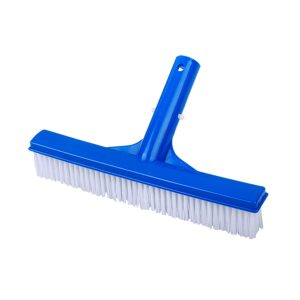Description
HIGHLY PRECISION SWIMMING POOL TEST STRIPS
PH (acidic/basic) : 7.2 – 7.6
CL (Total & Free Chlorine) : 1 – 3 ppm
BR (Bromine) : 3 – 5 ppm
TA (Total Alkalinity) : 80 – 120 ppm
CYA (Cyanuric Acid) : 30 – 50 ppm
TH (Total Hardness) : 200 – 400 ppm
Before attempting to operate your new chlorine generator, your pool’s water chemistry must be properly balanced. Properly balanced pool water is not only necessary for chlorine generation but also to protect your pool equipment and users of the pool.
BECAUSE SOME CHEMICALS INFLUENCE MORE THAN ONE CHEMISTRY PARAMETER, IT IS IMPORTANT THAT YOU FOLLOW THE STEPS IN THE ORDER PRESENTED.
TOTAL CHLORINE
refers to the amount of chlorine that has yet to combine with chlorinated water to effectively sanitize contaminants, which means that this chlorine is free to get rid of harmful microorganisms in the water of your swimming pool.
FREE CHLORINE
is the total amount of chlorine in the water. … The chlorine that is still active to remove contaminants is known as free. When the chloramine level is higher than the free chlorine level (subtract free number from total), then you need to shock the water.
Adjust Cyanuric Acid
Cyanuric Acid (Stabilizer) is very important to the performance of your chlorine generation system. It’s a mild acid that helps prevent the breakdown of chlorine due to the sun’s ultraviolet rays.
IDEAL LEVEL: 30 – 50 ppm outdoor pools
0 ppm indoor pools
Test your pool’s Cyanuric Acid level using a pool test kit or bring a water sample to our local pool store.
Adjust Total Alkalinity
Total Alkalinity (TA) is a measure of the total alkaline substances found in the pool water. The results of improper TA levels range from corrosion of metal pool parts, staining of the pool, burning eyes, cloudy water and reduced chlorine efficiency.
IDEAL LEVEL: 80 – 120 ppm
Test your pool’s TA.
to increase the pool’s TA using Baking Soda (Sodium Bicarbonate 100%).
to decrease the pool’s TA using Muriatic Acid (Hydrochloric Acid 31.45%).
Adjust Total Hardness
Total Hardness is the measurement of the total amount of minerals that are found in your pool’s water. Too much calcium hardness will cause scaling in your pool and too little will cause the pool water to become corrosive.
IDEAL LEVEL: 200 – 400 ppm
Test your pool’s Total Hardness.
If low, add Calcium Chloride (77%)
If Total Hardness is high, dilute or replace the pool water.
Adjust pH
pH is the measure of how acid/alkaline the pool water is. If pH is too low, the water can be corrosive to pool equipment. If pH is too high, then the chlorine becomes much less effective for sanitization.
IDEAL LEVEL: 7.2 – 7.8
Test your pool’s pH.
To increase the pool’s pH, add Soda Ash.
To decrease pool pH, add Muriatic or dry Acid.






